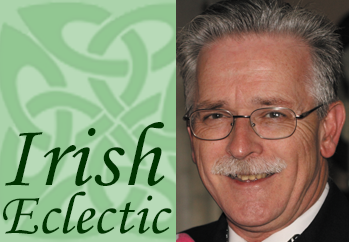How the Irish Saved Civilization – One Word at a Time!
Opinion Advocates for ideas and draws conclusions based on the author/producer’s interpretation of facts and data.
 By Brian McGowan
By Brian McGowan
This Friday, Oct. 18 marks the fourth anniversary of the passing of eminent Irish-American scholar and prolific author Thomas Cahill.
When Cahill, a Bronx native, died, he left behind an impressive body of work, including his most renowned book, “How the Irish Saved Civilization: The Untold Story of Ireland’s Heroic Role from the Fall of Rome to the Rise of Medieval Europe.” Published in 1995, I bought my first copy hot off the presses, devoured it and subsequently lost it.
Recently, my good friend John O’Loughlin – like Cahill a Fordham grad – lent me his dog-eared, well-worn copy. I devoured it again. Cahill’s depiction of the cataclysmic end of 1,000 years of Roman rule and cultural dominance across Europe, North Africa, the Middle East and beyond, again riveted my attention. Barbarian hordes once more pushed back the frontiers of the Empire to the very gates of Rome. By the year 476, it was all over in the West, and Europe descended into a period still known as the Dark Ages.
The intellectual treasure the Western world had possessed since the days of Classical Greece was threatened with being lost forever. Imagine no Aristotle, Socrates, Virgil, Homer, “The Odyssey.” As it is, much was lost anyway.
What survived was a vestige of what had been, but enough to allow the essence of classical civilization to survive. We can thank the efforts of a handful of scribes, both monks and nuns, who lived on an island at the fringe of Europe, beyond which the known world ended – Ireland. They toiled in monasteries scattered throughout the British Isles, all founded by Irish abbots and abbesses in the years following Saint Patrick’s arrival in Ireland.
They spent their lives copying whatever original source documents had survived destruction as Vandals, Goths and Huns laid waste to the Roman Empire. These ancient texts were copied over and over, and in time made their way back to continental Europe, where Irish saints and scholars established hundreds of monasteries during the sixth, seventh and eighth centuries. Many of these monasteries became famous learning centers and continue to exist today.
The Vikings burst upon the scene in the late eighth and ninth centuries, and destroyed many of the monasteries that had begun the work.
But the goal of copying and disseminating the resurrected knowledge of the ancient world had already been achieved. Europe was ready to enter the Middle Ages, and ultimately the Renaissance. All this, because a handful of Irish scribes had set out to save a body of knowledge that otherwise could have been lost forever.
Cahill gave voice to their efforts, in a slim book that stayed on The New York Times bestseller list for almost two years. To the Irish, Cahill’s revelations came as no surprise. But did your average man or woman in the street know this fact? Assuredly not!
Cahill’s accomplishment was to move the story into the mainstream. No longer would Ireland be looked upon as a cultural backwater. The book proudly trumpeted Ireland’s lasting contribution to the world, and continues to be popular to this day.
Though written nearly 30 years ago, Cahill’s closing words echo a grim warning to the current world, lest we think we are immortal.
“As we, the people of the First World, the Romans of the twentieth century, look out across our Earth, we see some signs for hope, many more for despair,” Cahill wrote. “Rome’s demise instructs us in what inevitably happens when impoverished and rapidly expanding populations, whose ways and values are only dimly understood, press up against a rich and ordered society. If the world’s population, which has doubled in our lifetime, doubles again by the middle of the next century, how could anyone hope to escape the catastrophic consequences – the wrath to come? But we turn our backs on such unpleasantness…”
Cahill wrote these words in the early 1990s, a relative age of innocence. Could things be any more dire than he suggests? What band of selfless individuals will step forth to rescue us? Only time – and a Thomas Cahill far off in the future – will tell.
Longtime Pleasantville resident Brian McGowan was born and raised in the Bronx, and is a second-, third- and fifth-generation Irish-American/Canadian, as his immigrant ancestors followed several paths to the New World. Reach him at brian.m.mcgowan1952@gmail.com. He is the author of three books: “Thunder at Noon,” about the Battle of Waterloo; “Love, Son John,” about World War II; and “Island Prize,” about the Revolutionary War in 1776 New York. All are available at Amazon.com.

Examiner Media – Keeping you informed with professionally-reported local news, features, and sports coverage.
